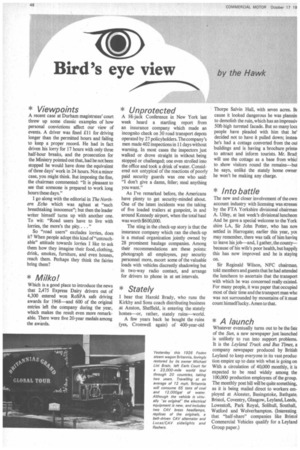Bird's eye view
Page 50

If you've noticed an error in this article please click here to report it so we can fix it.
by the Hawk * Viewpoints
A recent case at Durham magistrates' court threw up some classic examples of how personal convictions affect our view of events. A driver was fined Ll I for driving longer than the permitted hours and failing to keep a proper record. He had in fact driven his lorry for 17 hours with only three half-hour breaks, and the prosecution for the Ministry pointed out that, had he not been stopped he would have done the equivalent of three days' work in 24 hours. Not a minor case, you might think. But imposing the fine, the chairman commented: -It is pleasant to see that someone is prepared to work long hours these days."
I go along with the editorial in The Northern Echo which was aghast at "such breathtaking innocence"; but then the leader writer himself turns up with another one. To wit; "Road users have to live with lorries, the more's the pity.. . "
So "road users" excludes lorries, does it? When people adopt this kind of "untouchable" attitude towards lorries I like to ask them how they imagine their food, clothing, drink, smokes, furniture, and even houses, reach them. Perhaps they think the fairies bring them?
* Milko!
Which is a good place to introduce the news that 2,475 Express Dairy drivers out of 4,300 entered won RoSPA safe driving awards for 1968—and 600 of the original entries left the company during the year. which makes the result even more remarkable. There were five 20-year medals among the awards.
* Unprotected
A Hi-jack Conference in New York last week heard a startling report from an insurance company which made an incognito check on 30 road transport depots operated by 27 policyholders. The company's men made 402 inspections in 11 days without warning. In most cases the inspectors just walked or drove straight in without being stopped or challenged; one even strolled into the office and took a drink of water. Considered not untypical of the reactions of poorly paid security guards was one who said: "I don't give a damn, feller; steal anything you want."
As I've remarked before, the Americans have plenty to get security-minded about. One of the latest incidents was the taking of five loaded trailers at gunpoint, in and around Kennedy airport, when the total haul was worth $600,000.
The sting in the check-up story is that the insurance company which ran the check-up is a mutual organization jointly owned by 28 prominent haulage companies. Among their recommendations are these points: photograph all employees, pay security personnel more, escort some of the valuable loads with vehicles discreetly shadowing but in two-way radio contact, and arrange for drivers to phone in at set intervals.
* Stately
I hear that Harold Brady, who runs the Kirkby and Sons coach distributing business at Anston, Sheffield, is entering the stately homes—or, rather, stately ruins—world.
A few years back he bought the ruins (yes, Cromwell again) of 400-year-old Thorpe Salvin Hall, with seven acres. IR cause it looked dangerous he was plannin to demolish the ruin, which has an impressiv 50ft-high turreted facade. But so many boa people have pleaded with him that he' decided not to have it pulled down; instea he's had a cottage converted from the out buildings and is having a brochure printei to attract and inform tourists. Mr. Brad: will use the cottage as a base from whicl to show visitors round the remains—but he says, unlike the stately home owner he won't be making any charge.
* Into battle
The new and closer involvement of the own account industry with licensing was stressec by the FTA Yorkshire divisional chairman A. Utley, at last week's divisional luncheon And he gave a special welcome to the York. shire LA, Sir John Potter, who has now settled in Harrogate; earlier this year, yot may remember, there was talk of him having to leave his job—and, I gather, the county— because of his wife's poor health, but happily this has now improved and he is staying on.
Sir Reginald Wilson, NFC chairman, told members and guests that he had attended the luncheon to ascertain that the transport with which he was concerned really existed. For many people, it was paper that occupied most of their time and the transport man who was not surrounded by mountains of it must count himself lucky. Amen to that.
* A launch
Whatever eventually turns out to be the fate of the Sun, a new newspaper just launched is unlikely to run into support problems. It is the Leyland Truck and Bus Times, a company newspaper produced by British Leyland to keep everyone in its vast produc. tion empire up to date with what is going on With a circulation of 40,000 monthly, it is expected to be read widely among the 100,000 production employees of the group. The monthly post bill will be quite something, as it is being mailed direct to workers employed at Alcester, Basingstoke, Bathgate, Bristol, Coventry, Glasgow, Leyland, Leeds, Lowestoft, Park Royal, Solihull, Southall, Watford and Wolverhampton. (Interesting that "half-share" companies like Bristol Commercial Vehicles qualify for a Leyland Group paper.)




























































































































